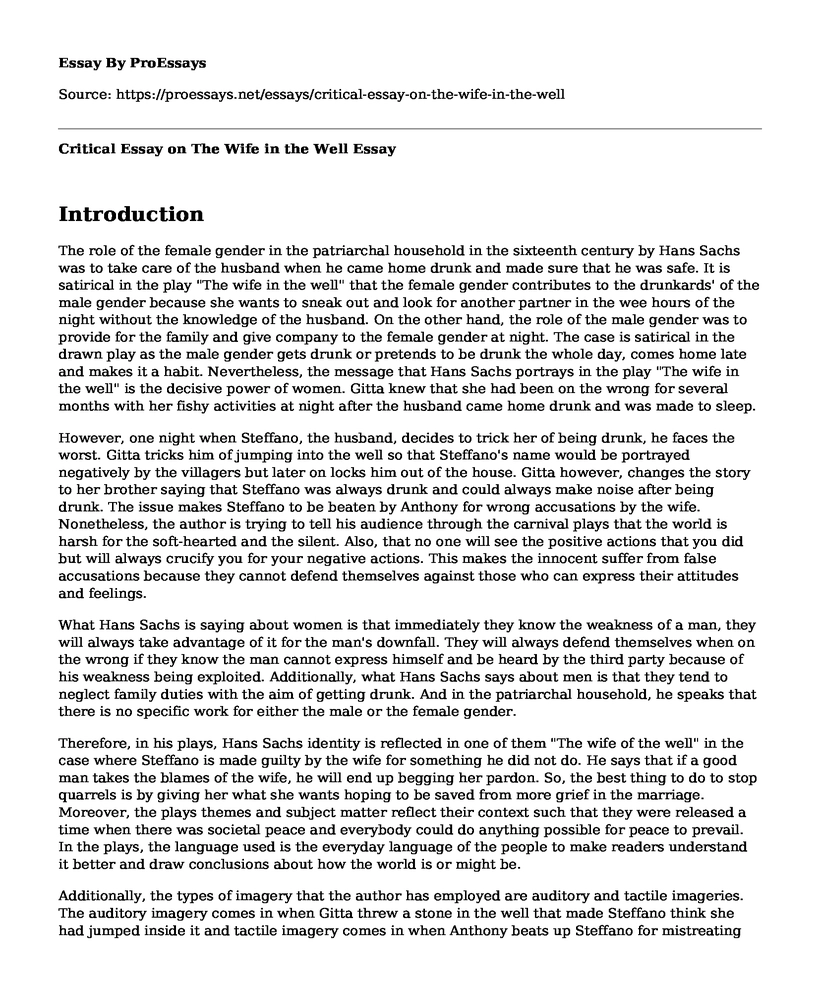Introduction
The role of the female gender in the patriarchal household in the sixteenth century by Hans Sachs was to take care of the husband when he came home drunk and made sure that he was safe. It is satirical in the play "The wife in the well" that the female gender contributes to the drunkards' of the male gender because she wants to sneak out and look for another partner in the wee hours of the night without the knowledge of the husband. On the other hand, the role of the male gender was to provide for the family and give company to the female gender at night. The case is satirical in the drawn play as the male gender gets drunk or pretends to be drunk the whole day, comes home late and makes it a habit. Nevertheless, the message that Hans Sachs portrays in the play "The wife in the well" is the decisive power of women. Gitta knew that she had been on the wrong for several months with her fishy activities at night after the husband came home drunk and was made to sleep.
However, one night when Steffano, the husband, decides to trick her of being drunk, he faces the worst. Gitta tricks him of jumping into the well so that Steffano's name would be portrayed negatively by the villagers but later on locks him out of the house. Gitta however, changes the story to her brother saying that Steffano was always drunk and could always make noise after being drunk. The issue makes Steffano to be beaten by Anthony for wrong accusations by the wife. Nonetheless, the author is trying to tell his audience through the carnival plays that the world is harsh for the soft-hearted and the silent. Also, that no one will see the positive actions that you did but will always crucify you for your negative actions. This makes the innocent suffer from false accusations because they cannot defend themselves against those who can express their attitudes and feelings.
What Hans Sachs is saying about women is that immediately they know the weakness of a man, they will always take advantage of it for the man's downfall. They will always defend themselves when on the wrong if they know the man cannot express himself and be heard by the third party because of his weakness being exploited. Additionally, what Hans Sachs says about men is that they tend to neglect family duties with the aim of getting drunk. And in the patriarchal household, he speaks that there is no specific work for either the male or the female gender.
Therefore, in his plays, Hans Sachs identity is reflected in one of them "The wife of the well" in the case where Steffano is made guilty by the wife for something he did not do. He says that if a good man takes the blames of the wife, he will end up begging her pardon. So, the best thing to do to stop quarrels is by giving her what she wants hoping to be saved from more grief in the marriage. Moreover, the plays themes and subject matter reflect their context such that they were released a time when there was societal peace and everybody could do anything possible for peace to prevail. In the plays, the language used is the everyday language of the people to make readers understand it better and draw conclusions about how the world is or might be.
Additionally, the types of imagery that the author has employed are auditory and tactile imageries. The auditory imagery comes in when Gitta threw a stone in the well that made Steffano think she had jumped inside it and tactile imagery comes in when Anthony beats up Steffano for mistreating the sister in the play "The wife of the well." Nonetheless, what has been emphasized is the defense power of the female gender as a way of protecting themselves. However, the author has deemphasized the role of the male gender in the society as he assumes that women have taken control over the society.
Cite this page
Critical Essay on The Wife in the Well. (2022, Aug 10). Retrieved from https://proessays.net/essays/critical-essay-on-the-wife-in-the-well
If you are the original author of this essay and no longer wish to have it published on the ProEssays website, please click below to request its removal:
- Being Lost in the Right Direction
- Use of Figurative Language in The Great Gatsby: Critical Essay
- The Theme of Silence in Woman Warrior - Critical Essay
- Literary Analysis Essay on Robert Frost's Classic Stopping by Woods on Snowy Evening: Ambiguity Abounds
- "Condemnation of the Duke" Is "The Least Interesting Response" in "My Last Duchess"
- Essay Example on Oedipus' Fate: Pride, Arrogance & Wrath of Fate
- Paper Example on Comparing Motifs in A Haunted House & The Jolly Corner







